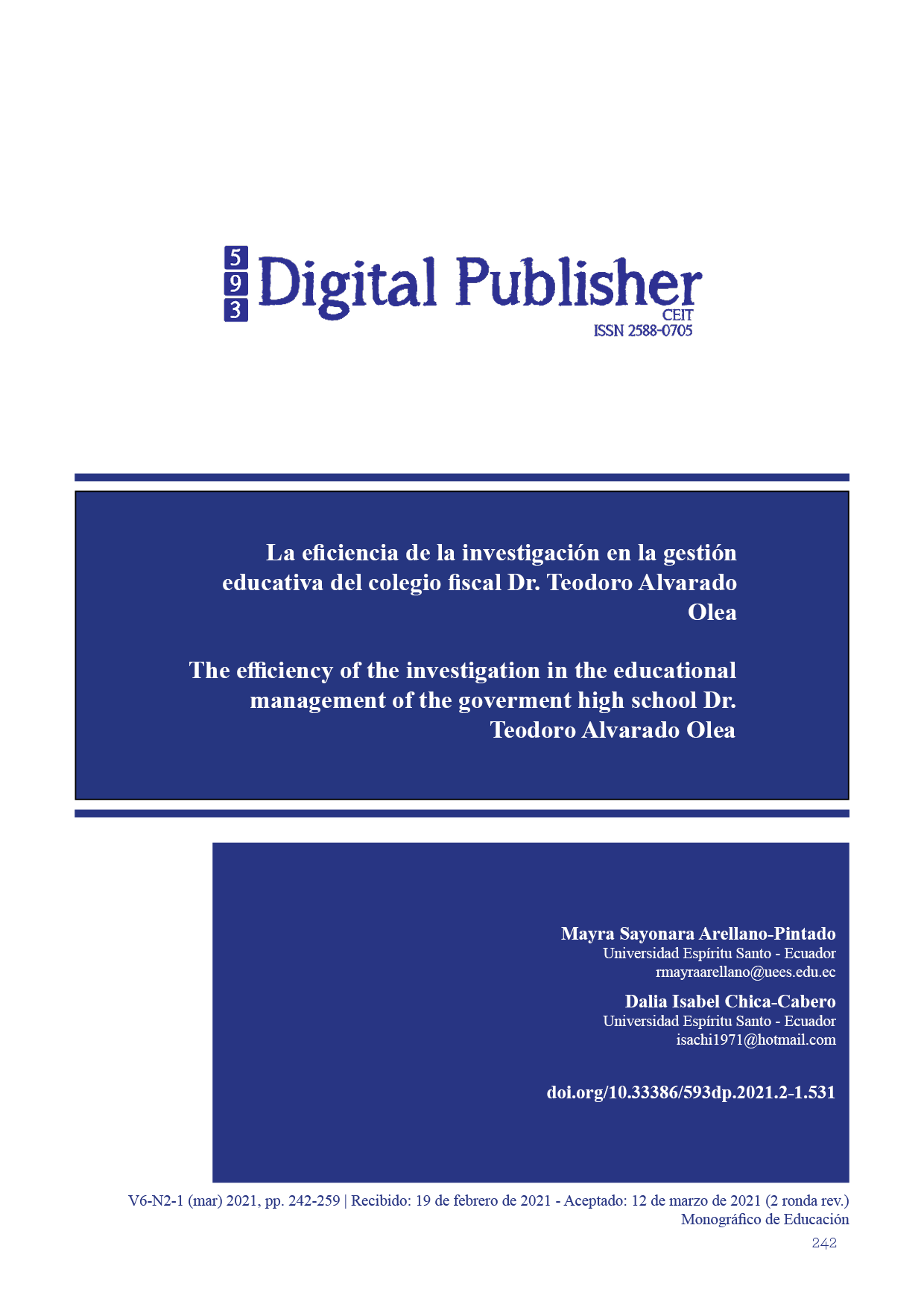The efficiency of the investigation in the educational management of the goverment high school Dr. Teodoro Alvarado Olea
Main Article Content
Abstract
The current demands of the contemporary world demand to sustain from the theory the efficiency of the investigation within the educational management in the Colegio Fiscal “Dr. Teodoro Alvarado Olea", as an alternative to an institutional pedagogical change, identifying the advantages as a route for quality management, analyzing each objective of the observation in order to improve the organization.
Scientific research is important because it allows updating knowledge in the search for information that enrich potentials, research as relevance improves the results of scientific, humanistic and sociocultural issues, allows obtaining dynamic and progressive knowledge that originates the needs of the individual.
The scientific article highlights a mixed approach that supports the historical-logical theoretical method, which is a method that allows knowing the antecedents of the object of study, therefore, the method of theoretical systematization can also be applied, which allows to deepen the analysis of the state of the art of variables, in addition to observation and synthesis for the conclusion of the investigative article and synthesizes the theories.
With regard to empirical methods, scientific observation, surveys and expert criteria have been considered to analyze the efficiency of educational management, research as teaching - learning must have a methodology that benefits reflective thinking within the parameters in different topics, also be flexible in your study.
As a general objective, a manual of methodological tools is proposed to optimize the teaching-learning processes in the quality and efficiency of research in educational management.
In short, research as part of a theoretical and methodological knowledge will serve in a positive way to structure the strategies and tools that should be applied in educational institutions, using the achievement indicators that will allow to obtain excellent results and a quality education with an efficient Education Management.
Downloads
Article Details

This work is licensed under a Creative Commons Attribution-NonCommercial-ShareAlike 4.0 International License.
1. Derechos de autor
Las obras que se publican en 593 Digital Publisher CEIT están sujetas a los siguientes términos:
1.1. 593 Digital Publisher CEIT, conserva los derechos patrimoniales (copyright) de las obras publicadas, favorece y permite la reutilización de las mismas bajo la licencia Licencia Creative Commons 4.0 de Reconocimiento-NoComercial-CompartirIgual 4.0, por lo cual se pueden copiar, usar, difundir, transmitir y exponer públicamente, siempre que:
1.1.a. Se cite la autoría y fuente original de su publicación (revista, editorial, URL).
1.1.b. No se usen para fines comerciales u onerosos.
1.1.c. Se mencione la existencia y especificaciones de esta licencia de uso.
References
Andrade, S. (2005). Diccionario de economía.
Antúnez, S. (2004). Organización escolar y acción directiva. Mexico.
Barriga, F. (2017). El papel de los actores y los procesos de gestión en la concreción de un proyecto curricular. San Luis Potosí.
Calvo, G. C. (2008). “¿Investigación educativa o investigación pedagógica? El caso de la investigación en el Distrito Capital. Revista Internacional de Investigacion Educativa, 163-173. Recuperado el 13 de Julio de 2020
Calvo, J. (2018). Enfoques teóricos para la evaluación de la eficiencia y eficacia en el primer nivel de atención médica de los servicios de salud del sector público.
Casassus, J. (2000). Problemas de la gestion educativa en america latina. Espacios.
Casimiro, A. (2015). “¿Todavía es posible hablar de un currículum político?”.
Cegarra, J. (2015). Evaluación de la eficiencia de la investigación: Metodología de la investigación científica y tecnológica.
Española, R. A. (2018).
Galán, M. (2017). ¿Cuáles son los beneficios de la investigación en la educación? EDUTIC. Recuperado el 5 de Octubre de 2020
Garay, F. (2015). Research as a means of teachers’ professional development: Challenges and perspectives.
García Argueta, I. (2019). La observación como Método Empírico de investigación. Universidad Autónoma del Estado de México, México.
García, I. (2019). La observación como Método Empírico de Investigación. Mexico.
Kennedy, M. (1997). The connection between research and practice.
Martinez, M. (2015). La investigación como forma de desarrollo profesional docente: Retos y perspectivas. SciElo.
Martinez, R. (2007). La investigación en la práctica educativa: Guía metodológica de investigación para el diagnóstico y evaluación en los centros docentes.
Ocaña, R. (2010). Pasado y presente de la investigación educativa. Revista Digital Universitaria, 3-7. Recuperado el 13 de Julio de 2020
Oliveira, C. M. (2003). Investigar, reflexionar y actuar en la práctica docente. Revista Iberiamericana de Educación, 33.
Onaida Calzadilla-González;Auxiliadora del Rocio Mendoza-Cevallos;Félix Díaz-Pompa. (2017). Análisis histórico-lógico de la formación de los profesionales de la educación primaria en el contexto ecuatoriano. Journal for Educators, Teachers and Trainers.
Rico, A. (2016). La gestión educativa: Hacia la optimización de la formación.
Rivero, D. C. (2017). Experiencia de la aplicación del método “histórico-lógico” y la técnica cualitativa. Revista Dilemas Contemporáneos: Educación, Política y Valores.
Rivero, D. C. (2017.). Experiencia de la aplicación del método “histórico-lógico” y la técnica cualitativa. Revista Dilemas Contemporáneos: Educación, Política y Valores.
Rosas, P. (23 de Febrero de 2018). La investigación educativa: conceptos y antecedentes.
Sañudo. (2019). Generacion de valor en la gestión educativa. Tendencia y estado actual en la REDEI, Ecuador . Espacios.
Thieme, C. P.-A. (2011). Desempeño de los centros educativos: ¿Un problema de recursos o capacidades organizativas? España: Hacienda Pública Española/Revista de Economía Pública.
Vanderlinde, R. (2010). The gap between educational research and practice: Views of teachers, school leaders, intermediaries and researchers.
Villagomez, P. (2018). Generación de valor en la gestión educativa. Tendencias y estado actual en la REDEI, Ecuador. Espacios. Obtenido de http://www.revistaespacios.com/a19v40n09/19400902.html
Willis, A. I. (2000). Political acts: Literacy learning and teaching. Reading Research Quarterly.
Zambrano, A. (2013). Pedagogía experimental, psicología y ciencias de la educaciónn en Francia. Revista Pilquen, 1-14. Recuperado el 13 de Julio de 2020



